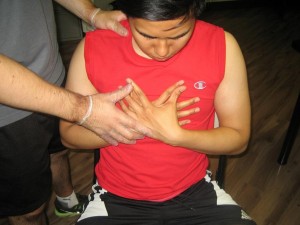Overview
After a cold season during winter and autumn, chest infections are taken as normal.
Despite the fact that most chest infections are mild and often get better without medication, other cases can be very risky and life-threatening.
Quick Information
The material posted on this page on breathing emergencies and chest pain is for learning purposes only. If you have chest pain seek medical help immediately. To learn to recognize and manage these emergencies as well as other cardiovascular and respiratory emergencies, enroll in a first aid and / or CPR course today.
Signs and Symptoms of Chest Infections

Bronchitis cases are mostly as a result of viruses while pneumonia is mainly due to bacteria.
The leading or prime symptoms of this infection are:
- Chest pains or tightness
- Wheezing sound
- Rapid heartbeat
- Fever
- Coughing of blood or coughing yellow and green phlegm
- Feeling disorientated and confused
- Breathlessness
- Persistent cough
Factors Contributing to Chest Infections
Chest infections simply refer to infections that affect the airways or the lungs. Most chest infections known are bronchitis and pneumonia.
Bronchitis cases are mostly as a result of viruses while pneumonia is mainly due to bacteria.
Other people who are prone to contracting severe chest infections include:
- Pregnant women
- Smoke addicts
- Elderly people
- Infants and young children
- Obese individuals
- People with a poor immune system may be as a result of recent illness, chemotherapy, and undiagnosed HIV infection.
Managing your Symptoms at Home
Chest infection aren’t serious most of the times and one may feel relieved a few days or weeks later. There is no point of visiting your GP if your symptoms are less serious and do not persist.
You can improve your signs at home as you recover through:
- Stopping smoking if you are a smoker
- Make breathing easier by use of extra pillows to raise your head while sleeping
- Using Paracetamol or ibuprofen to treat fever, headaches and pains since they are efficient painkillers
- Taking a warm drink of honey and lemon to ease a sore throat acquired from persistent coughing
- Preventing dehydration by drinking adequate amount fluids. This thin the mucus inside the lungs hence easing coughing it up
- Inhaling steam from a bowl containing hot water to relieve your cough. A humidifier can also be efficient to serve the same purpose
When is it Necessary to See a Doctor?
One should see his or her GP when?
- You’ve got a weakened immune system
- You are of 65 years and above
- You have difficulty in breathing
- You have persistent fever
- You’ve got a long-term health condition
- You are expectant
- You spit blood while coughing or experience blood-stained phlegm
- Your skin and lips changes and acquires a blue tinge
- You feel drowsy, confused and disorientated
- You suspect a child below the age of five has contracted a chest infection
- You are obese or overweight and have difficulty in breathing
- Your symptoms last longer than twenty-one days and portray very serious signs and symptoms
Related Video On Chest Infections
